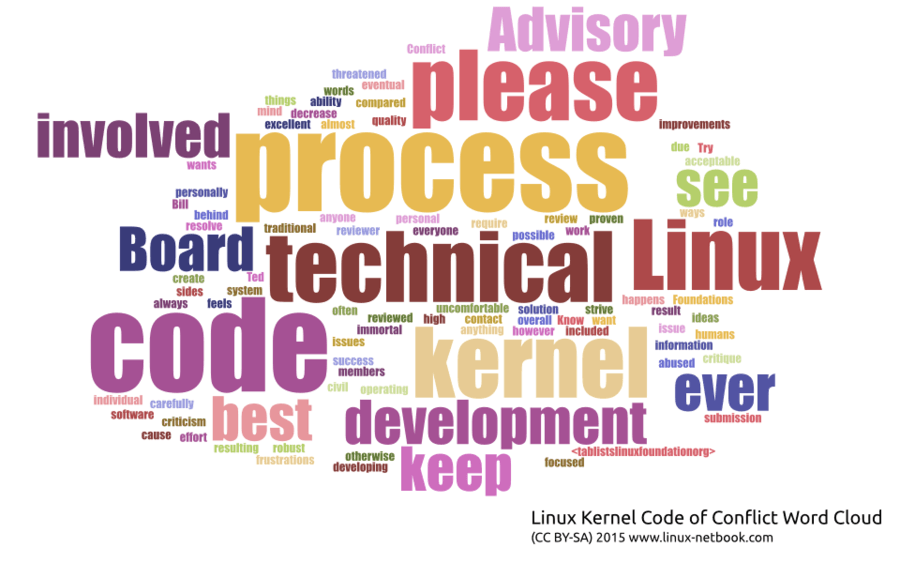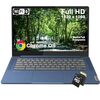Bits of Linux: 2015 #6
In this edition: Code of Conflict for Linux kernel developers, basic Linux terminology, Bash parameter expansion basics, Chromebook Pixel officially announced and more.
New Code of Conflict for Linux Kernel Developers
A small patch can draw a lot of attention as was exemplified recently by the Code of Conflict, that was added to the Linux Kernel by Greg Kroah-Hartman and merged by Linus Torvalds. Its purpose is summarized in Greg's commit message:
This file provides a basic guide for how to handle conflict resolution when it comes up in the development process.
The patch was acknowledged by more than 60 kernel developers, which probably does not happen all too often when a small text file without source code is added to Linux. Its significance was confirmed in a blog post from Jim Zemlin, Executive Director of the Linux Foundation.
If you don't know much about Linux or have lived in a cage for 20 years, you may not know that Linus can be quite rude, when it comes to rejecting kernel patches.
Personally, I appreciate that Linus does not pretend to be someone who is nice and polite all the time. That would be bad for him, the Linux project as a whole and also would not help the people who get rejected. Nonetheless, some of his statements are definitely below the belt and humiliating people in-front of a huge audience is more than unnecessary.
It's certainly too early for judgments on how this will affect kernel development, but providing a means of mediation and deescalation and asking people to be excellent to each other sounds more beneficial than detrimental to me. Let's see how this works as Linus himself put it.

📰 Articles / Videos
The Open Source Initiative on Floss Weekly
Simon Phipps and Patrick Masson talk about the Open Source Initiative (OSI) in episode 326 of Floss Weekly. In their own words they describe the organization as follows:
The Open Source Initiative (OSI) is a global non-profit that supports and promotes the open source movement. Among other things, we maintain the Open Source Definition, and a list of licenses that comply with that definition. See our about and history pages for more.
If you want to support their efforts you can donate to the OSI and/or become a member of the OSI.
Key Terms for Linux Newbies
There is a new YouTube channel from the guys behind Tek Syndicate called TekLinux, which focuses on Linux and Open Source. Their 2nd video Grokking Linux briefly introduces some key terms that people new to Linux should be aware of. You can watch the 20-minute video below:
Bash Parameter Expansion
Shell parameter expansion is a very powerful feature, that can be used for various purposes in shell scripts. This video by Conner McDaniel explains the basics of parameter expansion in Bash, which you can also read about in the Bash Reference Manual.
💬 Discussions / Q&A
kernel.org Sysadmin Answers Questions on Reddit
Konstantin Ryabitsev, one of the kernel.org sysadmins, did an AMA on Reddit. Some of the things you'll learn are, that they run Red Hat Enterprise Linux in production and use Raspberry Pis to do auto-signing for sha256sums. The latter being cost and energy efficient and it avoids sharing private keys in contrast to a VM based solution.
Also, there is going to be a vacancy soon, as Konstantin plots to poison his colleague Eric for asking a mean question about Kvass, a Russian drink made from fermented bread, that Konstantin apparently likes to drink.
Favorite Shell and why?
Redditor Plasma_eel asked what shell people use and why. Unsurprisingly, Bash is one of the favorites due to it being the default almost everywhere. Also zsh and mksh seem to be pretty popular among the certainly not representative group of people who answered. Nonetheless, it is interesting that availability seems to be the crucial argument in favor of Bash.
💻 Linux Devices
I added specs for the Acer Chromebook 15 CB5-571 C9GR, which is available in Germany. Currently, there are 10 more Linux laptop specs in my queue, mostly Chromebooks, waiting to be added within the next couple of days/weeks.
One of them will be the new Chromebook Pixel, that has been speculated about for a while, until Google ended the rumors with their official announcement. There are two models available for $999 and $1299, both of which being significantly cheaper than the 1st Pixel with WiFi and LTE respectively.
Not only are the new Pixels cheaper, but also more powerful with either a 2.2GHz Intel Core i5 processor and 8GB RAM or a 2.4GHz Intel Core i7 processor and 16GB RAM.
Another innovation is the USB Type C connector, which enables high-speed data exchange and display over the same connector cable. Moreover, USB Type C defines a new standard for charging devices, so you can use one charger for devices that support it. In practice this means that you still need an additional charger, until you have bought all those new devices. When that time comes, a new standard is set to be released...
In other news Canonical announced a collaboration with Dell to make Dell laptops running Ubuntu available in 500 stores in Latin America from local resellers. Good to see other Linux based operating systems on new laptops apart from Chrome OS.
📖 Open Source Projects / Resources
clf - Search commandlinefu Snippets from the Command Line
commandlinefu.com is a great resource for shell commands and with the clf utility you can search commandlinefu snippets from your terminal. clf is wtitten in Python and can be installed using pip:
pip install clf
To use it simply type clf followed with your search phrase:
clf find
The output of this command looks like:
# Find Duplicate Files (based on size first, then MD5 hash)
find -not -empty -type f -printf "%s\n" | sort -rn | uniq -d | xargs -I{} -n1 find -type f -size {}c -print0 | xargs -0 md5sum | sort | uniq -w32 --all-repeated=separate
# Recursively remove all empty directories
find . -type d -empty -delete
# Recursively change permissions on files, leave directories alone.
find ./ -type f -exec chmod 644 {} \;
# find files in a date range
find . -type f -newermt "2010-01-01" ! -newermt "2010-06-01"
...
😎 Fun Stuff
Apple Engineer Talks about the New 2015 Macbook
Apple recently introduced their new Macbook and received a lot of criticism, because it has just 2 ports (USB-C and headphone jack), a low-power mobile processor and only a 480P Webcam. For US $1300 you could call it an overpriced netbook as does the "Apple engineer" in the hilarious video below.
If you want to learn more about this Spanish guy named Juan Joya Borja, better known by his nickname El Risitas (The Giggles), with the distinctive and quasi-contagious laugh, you can read about this meme on knowyourmeme.
First World Chromebook Problems
Redditor Lentticat complains about his legs always being cold, because his Chromebook doesn't heat up. Do you have similar complaints, what is your biggest problem with Chromebooks?
VI VI VI Editor of the Beast
Did you know that there is a Church of Emacs formed by Richard Stallman himself, where vi is referred to as the Editor of the Beast because VI VI VI is 666 in Roman numerals.
Whether you're enlightened by the Church of Emacs or a diabolical vi user, you can show it with this cool design.
Bits of Linux is a bi-weekly round-up of interesting articles, discussions, Q&A, open source software projects, new Linux devices and reviews as well as a dose of fun stuff related to Linux, that have been published or I have discovered during the past 2 weeks. To not miss posts in this series, subscribe to the Bits of Linux RSS feed.
To be informed of new posts, subscribe to the RSS feed or follow Linux Netbook on Facebook.
Affiliate Disclosure: External links on this website may contain affiliate IDs, which means that I earn a commission if visitors make a purchase via such a link. For details, see the disclosure page.




